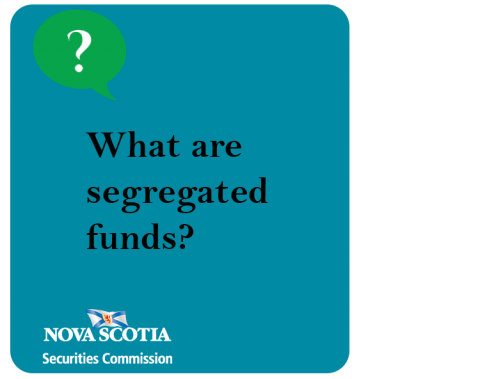Submitted by nsscadmin on

Earlier this week we received a call from a concerned investor who did not find her adviser when she went to check his registration. Was her adviser selling or advising on securities without being registered? The answer actually was no. The reason – he was selling segregated funds.
Segregated funds are investment funds, but they are classified as an insurance product and do not fall under the jurisdiction of securities regulators, such as the Nova Scotia Securities Commission. Someone selling segregated funds may also be registered to sell securities if they’re also selling mutual funds and bonds, etc. But, if they’re only dealing in segregated funds they do not require registration with a securities regulator, but instead are regulated by provincial insurance regulators.
So, what are segregated funds? A segregated fund has the growth potential of a mutual fund, but the added security of an insurance policy. The fund is a pool of investments, such as bonds, stocks, etc. but investors are not issued units or shares. Instead an investor receives and signs on to a segregated fund contract. This is a “defined variable annuity contract” which can be sold only by a licensed insurance representative. An investor does not have any ownership state in a segregated fund.
Another major difference between segregated funds and other investment funds is that they come with guarantees centered around maturity dates. A segregated fund will pay an investor a guaranteed amount at the time of maturity. This is typically 75 per cent or 100 per cent of the initial investment, or a higher amount if the fund’s value has exceeded the original investment. However, to receive this guarantee an investor must wait until maturity of the fund, which it usually 10 or 15 years.
If you invest in a segregated fund you are guaranteed to receive at least 75 per cent of your initial investment at time of maturity. To get this guarantee segregated funds usually have a higher management expense ratio than mutual funds to. These higher fees cover the cost of the insurance feature.
If you needed to withdrawal your money early (before the 10-year maturity date) you would not receive the guaranteed return, and instead would receive the current market value of the investment. There is also usually a penalty you would have to pay for the early withdrawal.
One advantage that come along with segregated funds is potential protection from creditors and probate. Money invested in segregated funds is usually protected from creditors and can be beneficial to businesses for this reason. A segregated fund also pays a guaranteed death benefit of 75 to 100 per cent to beneficiaries that is tax free and not subject to probate fees.
